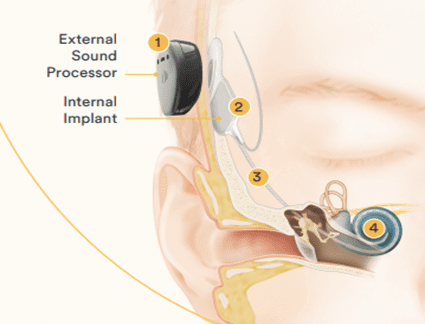When hearings aids are no longer enough.

Reconnect to a world of sound
Even when wearing hearing aids, do you feel frustrated and sometimes even exhausted from listening? You want to be able to enjoy life without planning around your hearing loss. Regardless of your age, hearing implants may be the solution you are looking for.
Cochlear implants are different from hearing aids
Hearing aids help many people by making the sounds they hear louder. Unfortunately, as hearing loss progresses, sounds need to be made clearer. Cochlear implants can help give you that clarity, even in noisy environments.

10-fold increase in hearing satisfaction
Hearing your friends and family in noisy situations is especially difficult for those with hearing loss. A Cochlear study showed that adults with cochlear implants reported a 10-fold improvement in hearing satisfaction versus hearing aids.
Take the Hearing Aid Check
To check the effectiveness of your hearing with hearing aids compared to people with cochlear implants, go to www.hearingaidcheck.com/au
Could a cochlear implant be right for you?
While wearing hearing aid(s), do you (tick ✓ all applicable):
- Have difficulty hearing conversations in noisy situations?
- Frequently ask people to repeat themselves? Often misunderstand what people say?
- Have trouble hearing on the telephone?
- Find yourself agreeing, smiling or nodding during conversations when you are not sure what has been said?
- Only hear from one ear?
If you answered YES to any of these questions, contact your hearing health professional, or the Cochlear Engagement Team on 1800 875 212
How much does a cochlear implant cost?
Cochlear implants are covered through the public health system or Medicare, government programs and private health insurance (hospital cover).
Private health insurance hospital cover may fund up to 100% of costs associated with cochlear implants. Coverage of the surgical procedure and any hospital costs will depend on your level of insurance.
State Governments fund cochlear implants for adults each year through the public health system. The number in each state varies and waiting lists may apply.
Department of Veterans’ Affairs (DVA) may cover up to 100% of costs associated with cochlear implants.

Common types and causes of hearing loss
Your hearing loss may affect one ear or both, and it may stem from a problem in the inner, middle or outer ear, or from a combination of these. Cochlear has hearing implant solutions for many types of hearing loss. Your hearing implant specialist will identify which hearing implant is right for you.
Sensorineural hearing loss (inner ear)
You have parts of your inner ear or auditory nerve that are damaged or not working properly. Possible causes: • Normal ageing process • Genetics • Certain medications • Overexposure to loud noise • Disease or illness
Conductive hearing loss (outer or middle ear)
When your outer or middle ear is damaged and prevents sound from reaching your inner ear.
Possible causes:
- Skin growth or cyst (cholesteatoma)
- Blockage in the ear canal
- Middle ear infections
- Malformation of the outer ear, ear canal, or middle ear structures
Mixed hearing loss
You have a problem with your outer or middle ear and your inner ear.
To find a hearing implant specialist near you, go to www.cochlear.com/au/en/connect/ find-a-clinic
How the cochlear implant system works
There are two main components of the cochlear implant system:
- External sound processor
- Internal implant
The sound processor and internal implant work together to bypass the part of the inner ear (cochlea) that no longer functions properly and delivers digital sound signals directly to your hearing nerve.
- Microphones on the sound processor pick up sounds and the processor converts them into a digital signal.
- This signal is sent to the implant just under the skin.
- The implant transfers the digital sound signal to the cochlear.
- The hearing nerve picks up the signal and sends it to the brain, where the sound is interpreted.

Start your hearing journey today
STEP 1: Hearing test
You first need to have your hearing tested by an audiologist who is well trained in hearing implants. Make an appointment with a hearing implant specialist to determine whether a hearing implant is right for you.
STEP 2: Implant procedure
The cochlear implant procedure is typically a same-day, outpatient procedure and is performed under general anaesthesia. The procedure is considered routine, but, there are risks and your surgeon will discuss these with you.
STEP 3: Activation/fitting
It’s the day you have been waiting for, when you start to enjoy your ability to hear. Over the next few months you will work with your audiologist to customise the device for your hearing needs.
STEP 4: Getting the most out of your cochlear implant
Before long, you may be hearing better than you thought possible. To help you learn more about your device and get the most from your hearing, you can join the Cochlear Family, the largest community of cochlear device recipients in the world. To learn more about our ongoing support, contact the Cochlear Engagement Team.
Be confident in your choice of hearing implant
At Cochlear, we pioneer the most advanced implantable hearing solutions in the world. Over 40 years ago, when Australian inventor Dr Graeme Clark invented the world’s first multi-channel cochlear implant, it opened up a whole new world of hearing to those who needed it most. As the global market leader in implantable hearing solutions, more people entrust their hearing to Cochlear than to any other hearing implant company.
Introducing the Cochlear Engagement Team
The Cochlear Engagement Team can help you explore implantable hearing solutions, whether you are first investigating your options or selecting a device that suits you. We can explain everything simply and help you at every step of your implantable hearing journey.
We can provide you with:
- Handy resources and educational events
- Cost and funding information
- The steps involved in the implantable hearing solutions journey
- Information on Cochlear products and how they work
Whether you are a candidate, a loved one or a healthcare professional, the Cochlear Engagement Team can assist you.
Contact us today
Call: 1800 875 212
SMS: +61447243454
